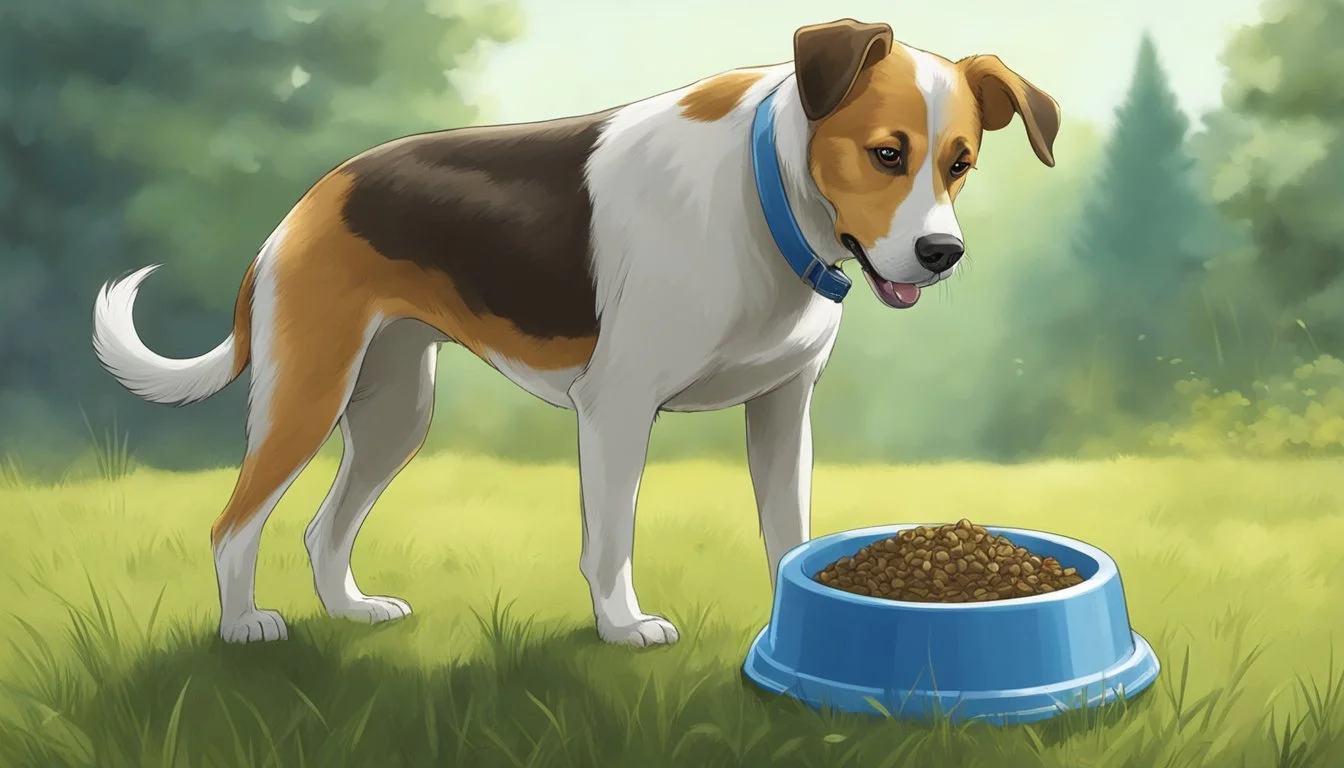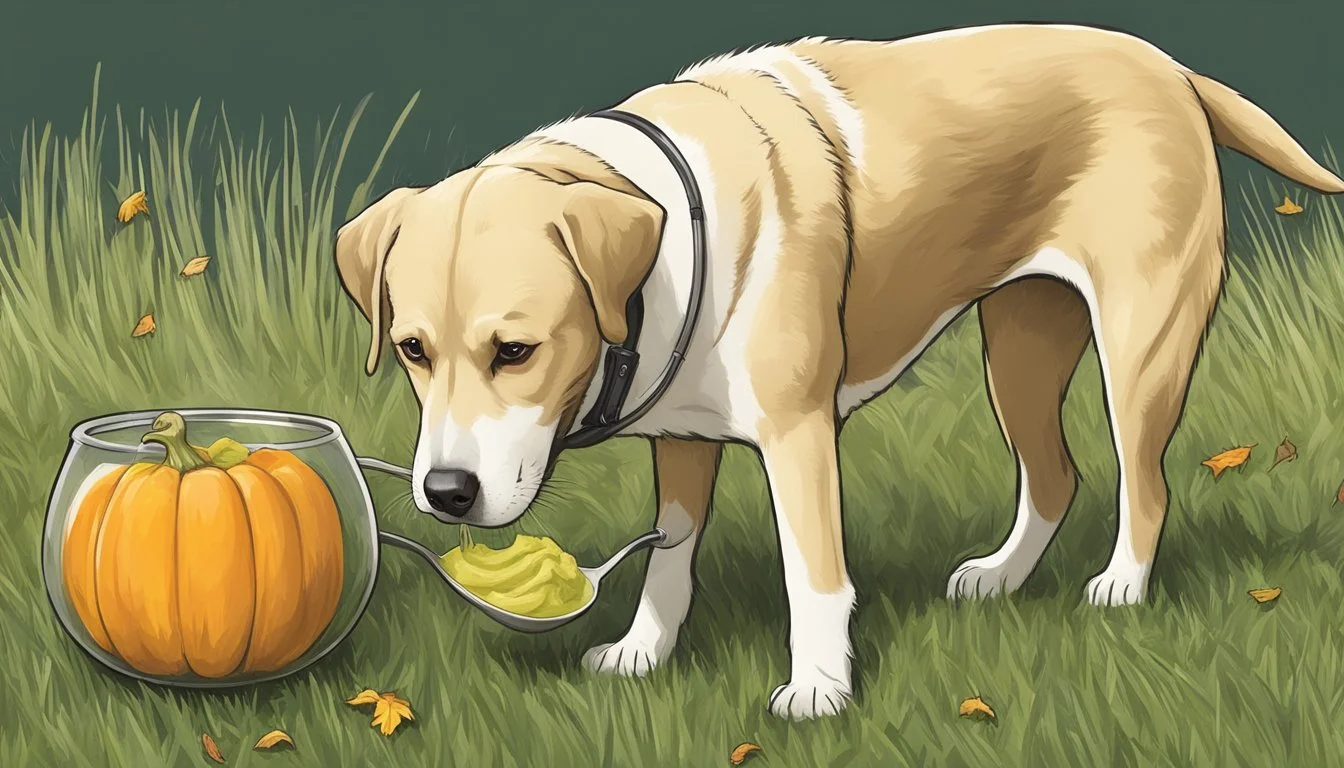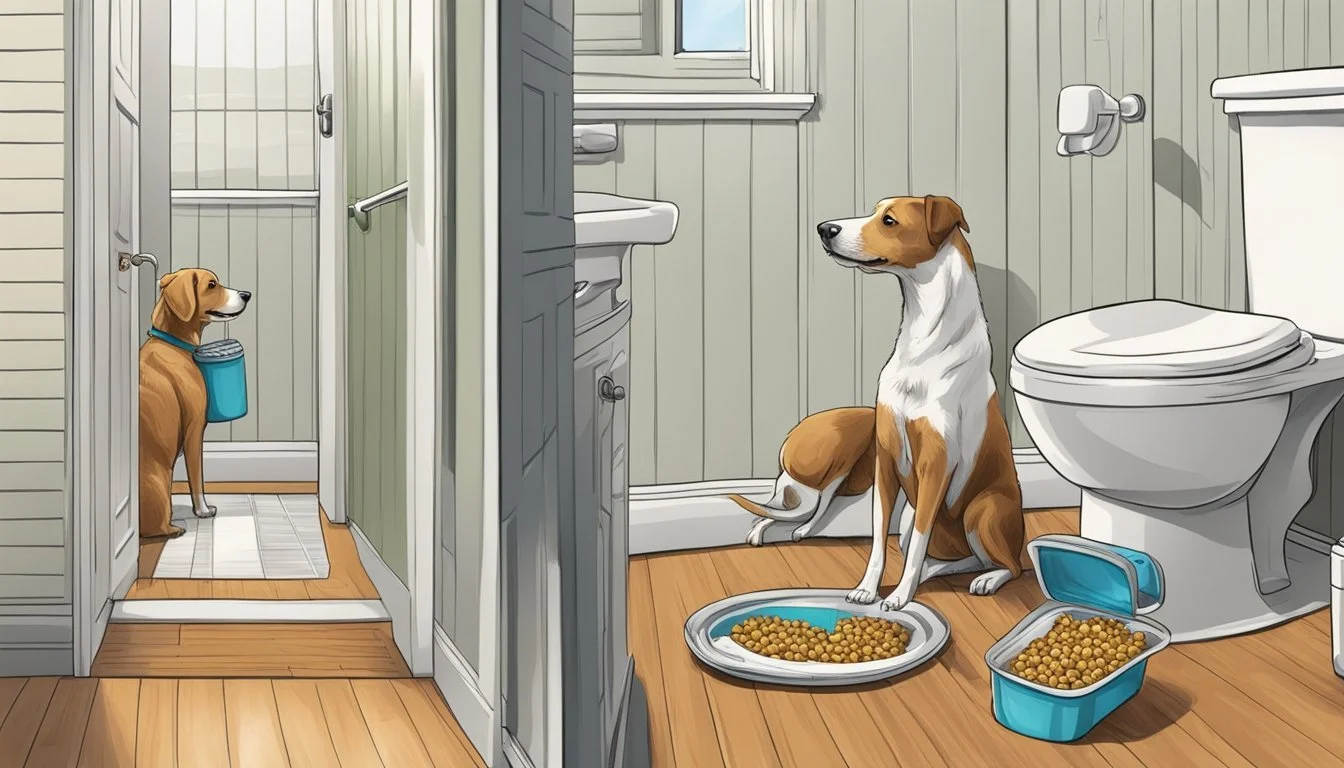Digestive-Friendly Foods to Improve Your Dog's Poop Health
Dog constipation is a common issue that many pet owners face, causing discomfort and potential health problems for their furry friends. Understanding the role of diet in maintaining regular bowel movements is crucial for preventing and alleviating constipation.
Certain foods can help dogs poop more regularly and comfortably, providing much-needed relief and promoting digestive health. This article will explore various food options and dietary tips to help ensure that dogs remain healthy and happy.
1) Pumpkin Puree
Pumpkin puree is a natural remedy for dogs experiencing digestive issues. It contains a high amount of soluble fiber, which aids in both constipation and diarrhea by adding bulk to the stool and regulating digestion.
For dogs with diarrhea, adding 1 to 4 tablespoons of pumpkin puree to their meals can help. Smaller quantities should be used initially to avoid too much fiber.
For constipation, the general recommendation is 1 tablespoon per 10 pounds of body weight. This dosage can be given once or twice a day. It's always wise to start with a lower amount and adjust as needed.
Pumpkin is also rich in essential vitamins and minerals, providing a nutritional boost. Always use plain, canned pumpkin without added sugars or spices. Fresh pumpkin cooked and pureed works well too.
2) Canned Dog Food
Canned dog food can be beneficial for dogs experiencing constipation. The high moisture content in canned food helps soften stools. This makes it easier for the dog to pass them.
When dry kibble isn't providing enough hydration, switching to a high-quality canned dog food may improve bowel movements. Dogs often consume more water when eating wet food, aiding digestion.
Canned dog food usually contains fewer fillers than dry food, which can help prevent constipation. Ingredients in canned food tend to be more digestible. This helps in maintaining regular bowel movements.
Including ingredients like pumpkin in the canned dog food can further assist in softening the stool. Pumpkin is a natural source of fiber. It helps regulate the dog's digestive system.
3) Yogurt
Yogurt, especially those with active probiotic cultures, can be beneficial for dogs experiencing constipation. The probiotics in yogurt help maintain a healthy balance of gut bacteria, which can aid digestion.
When selecting yogurt for dogs, it's important to choose varieties that do not contain artificial sweeteners, especially xylitol, which is toxic to dogs.
Greek yogurt is a good option due to its high probiotic content. Moderation is key, so only a small amount should be given to avoid potential stomach upset.
A tablespoon of plain yogurt mixed with your dog's regular food can help improve their bowel movements. It's a simple addition that can make a noticeable difference.
Dogs with lactose intolerance may not tolerate yogurt well. Always observe your dog after introducing yogurt to their diet to ensure there are no adverse reactions.
4) Sweet Potatoes
Sweet potatoes are a beneficial food to help dogs with constipation.
Rich in dietary fiber, sweet potatoes can promote healthy bowel movements. Their natural fiber content aids in softening the stool, making it easier for dogs to pass.
In addition to fiber, sweet potatoes provide essential nutrients such as vitamins A, B6, and C. These vitamins support overall health and well-being.
Beta-carotene, found in sweet potatoes, promotes good vision and supports muscle strength in dogs.
Feeding sweet potatoes in moderation is key. Overfeeding them may cause gastrointestinal discomfort.
Sweet potatoes can be served cooked and mashed. Ensure they are plain, without any added seasonings or ingredients.
5) Fiber Supplements
Fiber supplements can play a crucial role in improving a dog’s stool consistency. They work by adding bulk to the diet, which helps regulate the digestive process and improve bowel movements.
Two common fiber supplements for dogs are psyllium husk and canned pumpkin. Psyllium husk is effective in small amounts, typically between 2-4% of the dog’s diet.
Canned pumpkin is another popular option. It contains both fiber and water, making it a good choice for dogs needing better stool quality and hydration.
Incorporating fiber supplements must be done carefully. It’s important to start with small quantities and gradually increase to avoid any digestive disturbances.
Consulting a veterinarian before adding fiber supplements ensures the right dosage and type specific to the dog’s needs.
6) Boiled Chicken
Boiled chicken can be a beneficial food for dogs dealing with constipation or digestive issues. Its blandness makes it an easily digestible protein source. This simplicity can help ease the stomach and reduce the risk of further irritation.
When preparing boiled chicken for a dog, avoid adding any seasoning, oils, or spices. These additives can irritate the dog's digestive system. Stick to plain, skinless chicken breast to ensure it stays gentle on the gut.
The high protein content in boiled chicken supports overall muscle health. Combined with a balanced diet that includes fiber-rich foods, it can help maintain regular bowel movements. Always consult a veterinarian before making significant changes to a dog's diet.
7) Psyllium Husk
Psyllium husk is a natural source of fiber commonly used to support digestive health in dogs. It works by absorbing water in the intestines, which helps to regulate bowel movements.
For dogs experiencing constipation, psyllium husk can be a helpful remedy. It softens the stool and makes it easier to pass. Conversely, it can also aid in firming up loose stools by adding bulk.
Veterinarians often recommend psyllium for both constipation and diarrhea. It is important to consult with a vet to determine the correct dosage. Generally, the dosage is around 1 teaspoon per 10 pounds of body weight, given once a day.
When adding psyllium husk to a dog's diet, it's crucial to ensure they have access to plenty of fresh water. This helps the fiber expand and function properly within the digestive system.
Psyllium husk can be mixed with the dog's regular food for easy administration. Many dog owners find it an effective and simple way to maintain their pet's digestive health.
Be cautious not to overuse psyllium, as excessive amounts can lead to digestive discomfort or other issues. Always follow veterinary guidance for the best results.
8) Apple Slices
Apple slices can be a helpful addition to a dog's diet if they're experiencing constipation. Apples are rich in dietary fiber, which aids in the digestive process and helps alleviate constipation.
It's essential to cut the apples into small, manageable pieces, making them easier for the dog to eat and digest. Peeling the apples can also help, as it reduces the risk of choking and makes the fruit more digestible.
Care should be taken to remove all seeds and the core, as these parts of the apple contain cyanogenic glycosides, which can be harmful to dogs in large quantities. By focusing on the flesh of the apple, you can safely introduce this nutrient-rich fruit to their diet.
9) Carrot Sticks
Carrot sticks are a healthy and natural option to aid in a dog's digestion. They provide a good amount of dietary fiber, which can help to regulate bowel movements and ease constipation.
Feeding a dog carrot sticks also has the benefit of being low in calories and fat. This makes it a suitable treat for dogs that need to maintain or lose weight.
Carrots are rich in vitamins A, K, and C, contributing to overall health, including skin and coat vitality. They also act as a natural dental chew, promoting oral hygiene by reducing plaque build-up.
Due to their high water content, carrots can help keep dogs hydrated. It's essential to give them in moderation, as too many can cause digestive upset.
Always remember to cut carrot sticks into appropriate sizes to prevent choking hazards, especially for smaller dogs.
10) Brown Rice
Brown rice is a beneficial food for dogs experiencing digestive issues, including diarrhea. When prepared and fed correctly, it can help firm up loose stools due to its high fiber content.
To prepare brown rice, start by rinsing it under cold water to remove excess starch. This step is crucial as it reduces the likelihood of gas and bloating.
Cook the rice thoroughly by combining one part rice with three parts water. Bring it to a boil, then reduce the heat and cover. Ensure the rice is cooked until it is soft and mushy, making it easier for dogs to digest.
Once cooked, let the rice cool to room temperature. This helps prevent any potential discomfort from hot food and makes it easier for your dog to eat. Introduce the rice gradually, starting with a small amount mixed into your dog's regular food.
Brown rice can also be found as an ingredient in various commercial dog foods, adding nutritional value. Always ensure that any new food is properly introduced to avoid additional digestive upset.
Understanding Dog Digestion
Dog digestion is crucial for understanding how different foods impact their stool quality and common digestive issues they may face. Proper digestion ensures dogs absorb necessary nutrients and maintain good health.
How Food Affects Stool Quality
A dog’s diet significantly affects stool quality. Foods high in fiber, like canned pumpkin or sweet potato, add bulk to stools and assist in regular bowel movements. Fiber helps by slowing down food transit, allowing for better nutrient absorption and firmer stools.
High-water content foods, such as pumpkin, hydrate stools and help with constipation. Additionally, digestible proteins in the diet should be balanced to avoid overly hard or loose stools. Thus, diet composition is key for optimal stool quality.
Common Digestive Issues
Dogs can face several digestive issues. Constipation often results from low fiber intake or dehydration; adding fiber-rich foods can alleviate this.
Diarrhea can be caused by food intolerances or infections, requiring dietary adjustments. Some dogs may have food allergies, notably to common dog food ingredients like chicken or beef, which trigger gastrointestinal upset.
Digestive enzymes are another factor; insufficient enzyme levels can lead to poor digestion and nutrient absorption, causing inconsistent stool quality. Identifying these issues early with appropriate dietary changes can help maintain a dog’s digestive health.
Dietary Considerations
When aiming to help a constipated dog, it is crucial to focus on their fiber intake and ensure they stay well-hydrated. These aspects can effectively promote bowel movements and overall digestive health.
Fiber Content in Dog Food
Fiber plays a significant role in regulating a dog's digestion. Foods such as pumpkin, sweet potato, and wheat bran are excellent sources of fiber.
Pumpkin: Rich in soluble fiber, it absorbs water and eases the movement of stools.
Sweet Potato: Adds bulk to the diet, aiding in stool formation.
Wheat Bran: Improves the consistency of feces, making it easier for dogs to defecate.
Incorporating these fiber-rich foods with regular dog meals can enhance digestive function and prevent constipation.
Importance of Hydration
Hydration is paramount for maintaining healthy bowel movements in dogs. Adequate water intake ensures that fiber can effectively move through the digestive system.
Fresh water should be available at all times.
Wet dog food, which has higher moisture content, can be mixed with dry kibble.
Proper hydration helps soften stools, making it easier for dogs to pass them without strain. Additionally, adding a small amount of aloe vera juice or diluted apple cider vinegar to the water can also promote regularity without causing harm.
Appropriate hydration combined with fiber-rich foods creates an optimal environment for healthy digestion in dogs.






